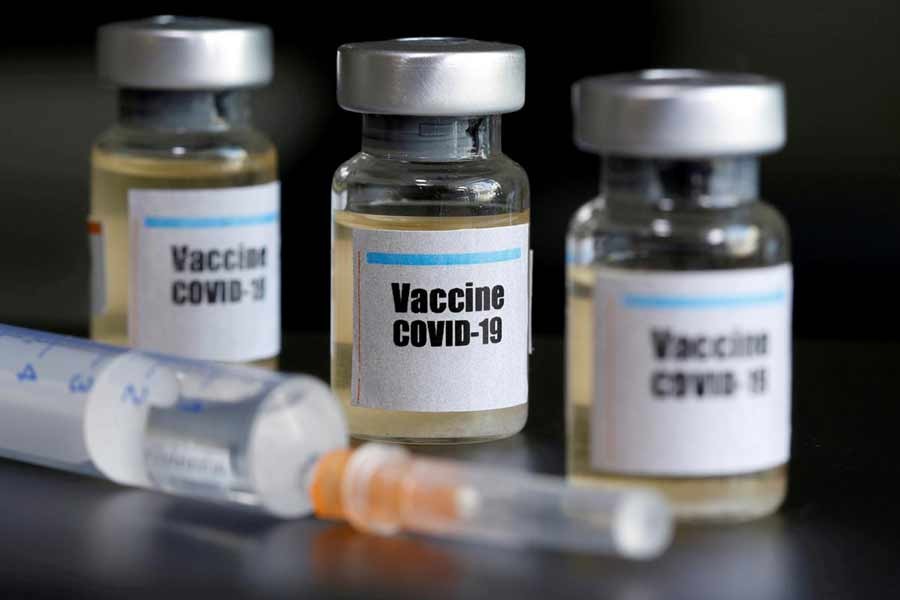Many countries have recently reported development in their COVID-19 vaccine trials, bringing hope to the world amid the still raging pandemic, while health experts called for an objective, rational and scientific attitude towards vaccine candidates.
At least 24 COVID-19 candidate vaccines are in clinical evaluation, and another 142 in preclinical evaluation, according to the World Health Organisation (WHO).
On Monday alone, four countries reported their new research results of COVID-19 vaccines.
Chinese experts said in a new study published in medical journal The Lancet that a phase-2 trial of a COVID-19 vaccine candidate has found that the vaccine is safe and induces an immune response.
"The phase-2 trial adds further evidence on safety and immunogenicity in a large population than the phase 1 trial. This is an important step in evaluating this early-stage experimental vaccine and phase-3 trials are now underway," said Professor Fengcai Zhu from Jiangsu Provincial Centre for Disease Control and Prevention, China.
A report published also in The Lancet reveals the results of the phase-1/2 trial of the Oxford coronavirus vaccine ChAdOx1 nCoV-19. It indicates no early safety concerns and produces strong immune response.
According to the University of Oxford, the trial involves more than 1,000 healthy adult volunteers. The vaccine provoked a T cell response (white blood cells that can attack cells infected with the SARS-CoV-2 virus) within 14 days of vaccination, and an antibody response within 28 days.
The Russian Defence Ministry said that together with the Gamaleya Scientific Research Institute of Epidemiology and Microbiology, it has successfully completed clinical trials of COVID-19 vaccine with the participation of volunteers.
"Without exception, all volunteers, having received immunity from the coronavirus, felt fine," First Deputy Defence Minister of the Russian Federation Ruslan Khadzhismelovich Tsaikov told Moscow's Argumenty i Fakty newspaper.
German biotech company BioNTech and US pharmaceutical corporation Pfizer announced that data from their experimental COVID-19 vaccine showed that it was safe, and induced an immune response and high-level T-cell responses against the novel coronavirus in patients.
Earlier this month, research institutes in other countries also reported progress in their COVID-19 vaccine trials.
In a study published July 14 in the New England Journal of Medicine, researchers reported that the COVID-19 vaccine mRNA-1273, co-developed by the US National Institute of Allergy and Infectious Diseases and U.S. biotech firm Moderna Therapeutics, induced immune responses and no serious side effects in volunteers in the second clinical trial.
Moreover, the University of Queensland in Australia, Chulalongkorn University in Thailand, among other institutes, also reported positive results in their COVID-19 vaccine research.
Despite the good news on COVID-19 candidate vaccines, experts warned of uncertainties of vaccine development and clinical trials, as well as multiple risks and challenges including virus mutation, while appealing for an objective, rational and scientific attitude towards vaccine research.
Dr. Michael Ryan, executive director of the WHO Health Emergencies Programme, said on July 3 that there is no accurate timetable for the delivery of COVID-19 vaccines.
Although the preliminary data of some candidate vaccines is quite promising, it is still unpredictable which one is totally clinically effective, he told a briefing.
While a vaccine candidate might show its effectiveness by year's end, the question is how soon it could be mass produced, he added.
Saudi Arabia's Asharq al-Awsat newspaper said recently those researchers should avoid being over-optimistic about the significant progress of some candidate vaccines in clinical trials, and wait for further trial results.
Merck CEO Kenneth Frazier said that the effectiveness of developing vaccines cannot be guaranteed.
Some studies showed that the level of anti-bodies will decline after COVID-19 patients recover. Joint efforts of scientific research teams are needed to tackle issues including how COVID-19 vaccines provide sufficient long-term immunity and how to deal with possible virus variation.
The WHO urged that before a COVID-19 vaccine is officially available; all countries should consistently take full-flung prevention and control measures.


